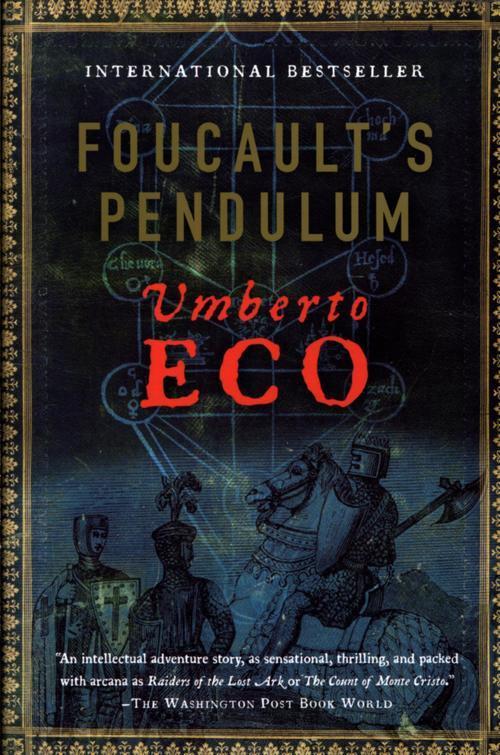Tenéis acceso cómodamente a esta reseña también AQUÍ telegra.ph/Una-defensa-del-pensamiento-l%C3%B3gico-09-13
La racionalidad y el empirismo como herramientas para acercarse a la verdad eran las protagonistas en “El nombre de la Rosa”. En “El Péndulo de Foucault” veremos a sus protagonistas recorrer el camino opuesto, cogiendo la irracionalidad a través del pensamiento mágico, los ritos y leyendas como la fuente de conocimiento y verdad. Esta novela puede ser leída, de esta forma, como un espejo del best seller universalmente leído de Eco.
Tres intelectuales de Milán serán los protagonistas. Por un lado tenemos a Belbo y Diotavelli, trabajadores ambos de dos editoriales algo sombrías dedicadas a la publicación de hipótesis cabalísticas, masonas, templarias, sionistas y otras “cuestiones religiosas y culturales”. De otro lado tenemos a Casaubon, un joven licenciado que nos llevará, desde la historia más académica, hasta las locuras de la irracionalidad panreligiosa. Con él, no solamente recorreremos la edad media europea y, en concreto, la historia de los templarios, si no que repasaremos la religiosidad mestiza brasileña, la cábala judía y otras sectas judeo-cristianas europeas.
Casaubon llega preguntarse si “¿es posible que la realidad no sólo sobrepase a la ficción, sino que la preceda, o más bien se apresure, con adelanto, a reparar los daños que la ficción provocará?” en su camino hacia el delirio de lo conspiranoico. La realidad precede a la ficción. Ahora, imaginad que, para explicar todas las corrientes pseudohistóricas que cuentan la historia de Europa durante los últimos 2000 años, hagamos un libro de más de 800 páginas. Pese a que la historia está bastante bien trenzada, hay momentos que son ásperos y de difícil lectura porque son páginas exigentes intelectualmente. Las personas historiadoras o con nociones sobre historia de las religiones gozarán mucho más de esta novela (su memoria de trabajo irá mucho más descargada que la de un simple mortal). Pese a ello hay pasajes tremendos, de una sabiduría casi universal o de un humor absurdo que roza la perfección.
Por ejemplo, en este pasaje sobre la Oximorónica sale a relucir, por un lado, el humor de los tres protagonistas, su actitud ante la academia y el inicio de un camino que los lleva desde el nihilismo intelectual, hasta la irrelevancia del conocimiento. Todo ellos es gracioso al principio, pero en cuanto se acepta que la “psicología de masas en el Sahara” puede tener algún sentido, comienza el principio del fin:
Diotallevi, y yo mismo, estamos proyectando una reforma del saber. Una Facultad de Trivialidad Comparada, donde se estudien asignaturas inútiles o imposibles. La facultad tiende a reproducir estudiosos capaces de aumentar al infinito el número de temas triviales. Por ahora cuatro, pero ya podrían contener todo lo cognoscible. El departamento de Tripodología Felina tiene una función propedéutica, tiende a desarrollar el sentido de lo trivial. Un departamento importante es el de Adynata o Impossibilia. Por ejemplo, Urbanística Gitana e Hípica Azteca... La esencia de esta disciplina consiste en comprender las razones profundas de su trivialidad, y en el departamento de Adynata también de su imposibilidad. Allí están, pues, la Morfemática del Morse, la Historia de la Agricultura Antártica, la Historia de la Pintura en la Isla de Pascua, la Literatura Sumeria Contemporánea, los Fundamentos de Examenología Montessoriana, la Filatelia asiriobabilónica, la Tecnología de la Rueda en los Imperios Precolombinos, la Iconología Braille, la Fonética del Cine Mudo... ¿Qué me dice de la Psicología de las Masas en el Sahara?
Y en este pasaje (bastante largo) sobre los tipos ideales de personas (intelectuales, escritores/as, pensadores/as, filósofos/as, etc.) es una delicia argumentativa, con diversos guiños (algunos de ellos los he recortado por razón de espacio), con muy mala leche, pero que recoge también el vector de la novela: una editorial (y por extensión, un periódico, una televisión, una radio o cualquier forma de comunicación) se nutre de estúpidos y locos. Los estúpidos al menos son honrados e intentan argumentar (érroneamente) sus tesis. Los locos no y están dispuestos a creerse cualquier cosa que apoye su tesis ¿Nos recuerda eso a algo de nuestra realidad contemporánea? El pasaje está recortado, así que si queréis tener todos los matices, os recomiendo la novela (pp. 90-97, edición Plaza &Janes)
Está recortado, así que sugiero su lectura completa en en la novela:
En el mundo están los cretinos, los imbéciles, los estúpidos y los locos. En suma todo el mundo, si se mira bien, participa de alguna de esas categorías. Cada uno de nosotros de vez en cuando es un cretino, un imbécil, un estúpido o un loco. Digamos que la persona normal es la que combina razonablemente todos esos componentes o tipos ideales.
—Bravo. ¿También sabe alemán?
—Algo masco para las bibliografías (…). El lo consigue. Por eso es un cretino. No nos interesa, se le reconoce en seguida, y no aparece por las editoriales. Dejémosle donde está. Ser imbécil ya es más complicado. Es un comportamiento social. El imbécil es el que habla siempre fuera del vaso. Así: quiere hablar de lo que hay en el vaso, pero, esto por aquí, esto por allá, habla fuera. O si prefiere, es el que siempre mete la pata, el que le pregunta cómo está su bella esposa al individuo que acaba de ser abandonado por la mujer. ¿Me explico? El imbécil está muy solicitado, sobre todo en las reuniones mundanas. Incomoda a todos, pero les proporciona temas de conversación. En su versión positiva llega a ser diplomático. Habla fuera del vaso cuando otros han metido la pata, consigue cambiar de tema Pero a nosotros no nos interesa, no es nunca creativo, trabaja de prestado, de manera que no presenta manuscritos en las editoriales. El imbécil no dice que el gato ladra, habla del gato cuando los demás hablan del perro. Confunde las reglas de conversación, y cuando las confunde bien es sublime. Creo que es una raza en extinción, un portador de virtudes eminentemente burguesas (…).
—¿Y el estúpido?
Ah. El estúpido no se equivoca de comportamiento. Se equivoca de razonamiento. Es el que dice que todos los perros son animales domésticos y todos los perros ladran, pero que también los gatos son animales domésticos y por tanto ladran. O que todos los atenienses son mortales, todos los habitantes del Pireo son mortales, de modo que todos los habitantes del Pireo son atenienses. Si, pero de pura casualidad. El estúpido incluso puede decir algo correcto, pero por razones equivocadas (…). No está mal. Ya estamos en el umbral en el que sospechamos que algo no funciona, pero es necesario un esfuerzo para demostrar qué es lo que no cuadra y por qué. El estúpido es muy insidioso. Al imbécil se le reconoce en seguida (y al cretino ni qué decir), mientras que el estúpido razona casi como uno, sólo que con una desviación infinitesimal. Es un maestro del paralogismo. No hay salvación para el redactor editorial, debería emplear una eternidad. Se publican muchos libros escritos por estúpidos, porque a primera vista son muy convincentes. El redactor editorial no está obligado a reconocer al estúpido. No lo hace la academia de ciencias, ¿por qué tendría que hacerlo él? (...)
Pues sí, la estupidez nos rodea. Y quizá para un sistema lógico diferente nuestra estupidez sea sabiduría. Toda la historia de la lógica es un intento por definir una noción aceptable de estupidez. Demasiado ambicioso. Todo gran pensador es el estúpido de otro.
—El pensamiento como forma coherente de estupidez.
—No. La estupidez de un pensamiento es la incoherencia de otro pensamiento (…).
Al loco se le reconoce en seguida. Es un estúpido que no conoce los subterfugios. El estúpido trata de demostrar su tesis, tiene una lógica, cojeante, pero lógica es. En cambio, el loco no se preocupa por tener una lógica, avanza por cortocircuitos. Para él, todo demuestra todo. El loco tiene una idea fija, y todo lo que encuentra le sirve para confirmarla. Al loco se le reconoce porque se salta a la torera la obligación de probar lo que se dice; porque siempre está dispuesto a recibir revelaciones.
En resumen (no, esto no lo ha escrito un LLM), la interpretación de esta novela es en su fondo epistemológico, similar a la del “El nombre de la rosa”. Una defensa de la racionalidad. Sin embargo, en este caso lo que tenemos es una crítica despiadada a muchas de las tendencias New Age que surgieron tras el mayo de 1968 (en el cual por cierto, también se ambienta la novela, dejando claro el ámbito de la crítica). No es que haga una crítica a la crítica que hicieron diversas corrientes filosóficas y científicas en aquellos años, si no que la crítica va dirigida a esa deriva que algunas tuvieron. No es lo mismo criticar el determinismo biológico o el reduccionismo metodológico, que criticar la ciencia de forma genérica y hacer una enmienda a la totalidad y mostrando como alternativa una síntesis persona e individual de aquello que crees que es cierto. Nos situamos en el terreno de los locos. Es mucho mejor estar en el de la estupidez.



